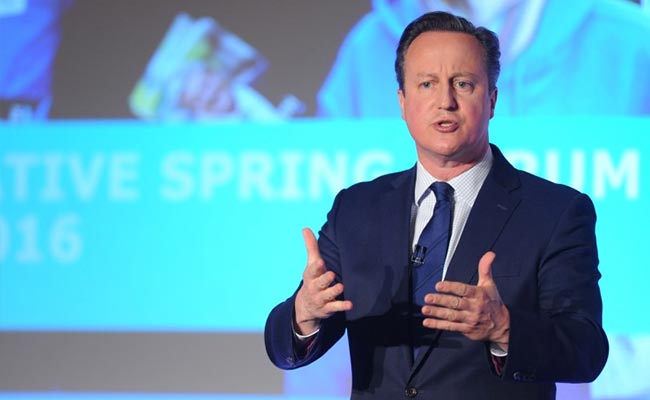7 Years After Brexit Debacle, Ex-PM David Cameron Returns To UK Politics


At the 2010 general election, David Cameron became the youngest premier for 200 years.
Former Prime Minister of the United Kingdom David Cameron made a surprise comeback to the Cabinet after being appointed as the new foreign secretary after Prime Minister Rishi Sunak sacked interior minister Suella Braverman and appointed Foreign Secretary James Cleverly to Ms Braverman’s post.
David Cameron’s return to a political role comes almost seven years after he quit the top post following the result of the Brexit referendum. The former Prime Minister held three referendums over Britain’s exit from the European Union (EU). Interestingly, Rishi Sunak supported Britain’s exit from the United Kingdom in 2016. “I voted for Brexit, I believe in Brexit, Mr Sunak said.
After the 2010 general election, David Cameron became the youngest Prime Minister for 200 years, but the Conservatives did not win enough seats to govern alone and had to form a coalition with the Liberal Democrats.
Comeback
David Cameron’s comeback comes after Rishi Sunak fired Suella Braverman for criticizing Pro-Palestine protests and also defied the Prime Minister after writing an article questioning the “double standards” of the police in its treatment of protests
“Though I may have disagreed with some individual decisions, it is clear to me that Rishi Sunak is a strong and capable Prime Minister, who is showing exemplary leadership at a difficult time,” David Cameron said.
The Prime Minister has asked me to serve as his Foreign Secretary and I have gladly accepted.
We are facing a daunting set of international challenges, including the war in Ukraine and the crisis in the Middle East. At this time of profound global change, it has rarely been more…
— David Cameron (@David_Cameron) November 13, 2023
“We are facing a daunting set of international challenges, including the war in Ukraine and the crisis in the Middle East. At this time of profound global change, it has rarely been more important for this country to stand by our allies, strengthen our partnerships and make sure our voice is heard,” he added.
Brexit And David Cameron’s Exit
The citizens of the United Kingdom voted narrowly in favour of withdrawing from the European Union. Fifty-two per cent voted in favour of the notion of leaving the EU while 48 per cent were against it. The results backfired for Mr Cameron who hoped that the results would not favour Brexit.
The global markets tanked after the Brexit results and forced David Cameron to exit 10 Downing Street, the official residence of the Prime Minister of the UK. “I do not think it would be right for me to try to be the captain that steers our country to its next destination,” Mr Cameron said in his emotional address.
The political fallout caused the markets to suffer and the pound dropped to its lowest level since 1985.
“I think it’s right that this new prime minister decides when to trigger Article 50,” Cameron said.
Article 50 says this: “A Member State which decides to withdraw shall notify the European Council.”
Britain formally left the EU in 2020 and what remained was a legacy of political instability and back-to-back exits of future Prime Ministers. Theresa May, Boris Johnson and Liz Truss faced anti-incumbency and couldn’t complete their tenures.
Rising The Ranks
The son of a stockbroker, Cameron was educated at elite boarding school Eton and Oxford University, where he was admitted to the Bullingdon Club, a hard-drinking, socially exclusive student group.
He worked for the Conservatives as an advisor before a stint in public relations, which ended when he was elected to parliament in 2001.
Cameron’s first election victory in 2010 ended 13 years of Labour government. He had been widely praised for giving his party a broader centrist appeal.
“I believe in public service. That is what first motivated me to get involved in politics in the 1980s, to work in government in the 1990s, become a Member of Parliament in the 2000s and put myself forward as Party Leader and Prime Minister,” Mr Cameron said.
Lobbying Allegations
In 2021, the British government opened an official independently-run investigation into former Prime Minister David Cameron’s lobbying activities for financier Lex Greensill.
While Cameron was British prime minister from 2010 to 2016, the Australian banker was brought in as an adviser to the government. After leaving office, Cameron in turn became an adviser to Greensill’s now-insolvent finance firm.
The Financial Times and Sunday Times newspapers reported that Cameron contacted ministers directly to lobby on behalf of Greensill Capital, including sending texts to finance minister Rishi Sunak and arranging a private drink between Greensill and Health Secretary Matt Hancock.
With Inputs from AFP

